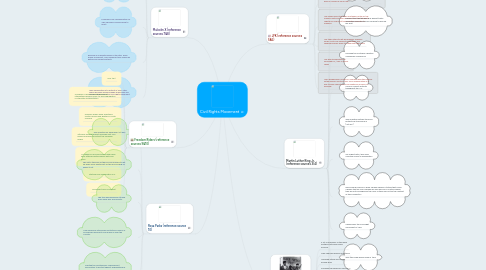Civil Rights Movement
by Courtney Dumont

1. Malcolm X (reference sources 7&8)
1.1. Urged followers to defend themselves against white aggression by any means necessary
1.2. Changed his last name to X to show his rejection of his "slave" name
1.3. Compared JFK's assassination as "The Chickens coming home to roost"
1.4. Became an influential figure in the later black power movement. This movement was fueled by hatred and violent protests
1.5. Was assassinated at a protest in 1965. After which his book become highly publicized and played a huge role in the civil rights movement.
2. Freedom Riders (reference sources 9&10)
2.1. May 1961
2.2. Congress of Racial Equality organized integrated Freedom Rides to defy segregation in interstate transportation
2.3. Freedom Riders were arrested in North Carolina and Beaten in South Carolina.
2.4. Attorney General Robert Kennedy sent 400 federal marshals to protect the Freedom Riders
2.5. In Alabama a bus was burned and riders were attacked with baseball bats and irons
2.6. Starting from Washington D.C.
2.7. Nonviolent form of protest
3. Rosa Parks (reference source 10)
3.1. Was Arrested on December 1st 1955
3.2. She sat in the back of the bus and refused to get up when more whites got on the bus and had no where to sit
3.3. The trial was december 5th and Rosa Parks was found guilty
3.4. One december 5th people protested in honor of Rosa parks refusing to ride buses all over the country
3.5. Created the Montgomery Improvement Association to protest against segregated bus laws
3.6. Martin Luther King became a prominent leader of the Montgomery Improvement Association
4. JFK (reference sources 5&6)
4.1. Appointed unprecedented number of African Americans to high-level positions in the administration and strengthened The Civil Rights Comission
4.2. Addressed the American people saying “I shall ask the Congress of the United States to act, to make a commitment it has not fully made in this century to the proposition that race has no place in American life or law.”
4.3. JFK issues executive order and takes control of the Alabama national guard in order to let two students register for school at the all white University of Alabama
4.4. JFK takes steps to get Birmingham Alabama under control by having troops ready and sending officials down to make keep the peace
4.5. JFK was assassinated on november 22, 1963 In Dallas Texas
4.6. JFK's predecessor Lyndon B. Johnson used the national outpouring of emotion over JFK's assassination as a way to gain support for a civil rights bill in honor of Kennedy
5. Martin Luther King Jr. (reference sources 3/4)
5.1. Baptist Minister and Civil Rights activist
5.2. King led the Montgomery Bus Boycott after Rosa Parks was arrested for refusing to give up her seat
5.3. Founded the Southern Christian Leadership Conference
5.4. Led non-violent protests throughout the U.S.
5.5. Was arrested multiple times for protests he took place in ("sit-ins")
5.6. On August 28th, 1963 King Lead the March on washington
5.7. King made his famous I have a dream speech. Stating that"I have a dream that my four children will one day live in a nation where they will not be judged by the color of their skin but by the content of their character."
5.8. Helped pass the Civil Right Movement of 1964
5.9. Won the Nobel peace prize in 1964
5.10. Helped pass the voting rights act of 1965
5.11. King was assassinated in 1968
6. The Black Panther Party (reference sources 1&2)
6.1. A lot of members of the Black Panther Party were black muslims
6.2. They opposed passive resistance
6.3. Harassed police and carried around guns
6.4. Followed the beliefs of Malcolm X
6.5. The two founders of the movement were Huey Percy Newton and Bobby Seale
6.6. Thought the Martin Luther King Juniors approach was to slow and ineffective
6.7. The Black Panther protests scared a lot of people and turned them towards MLK's peaceful protests


